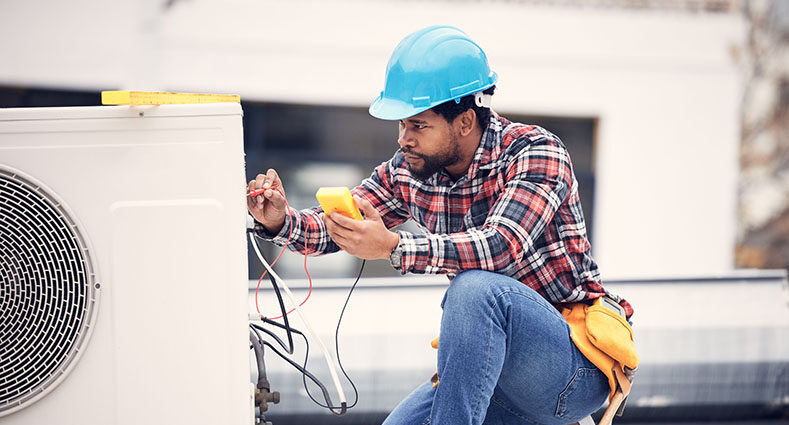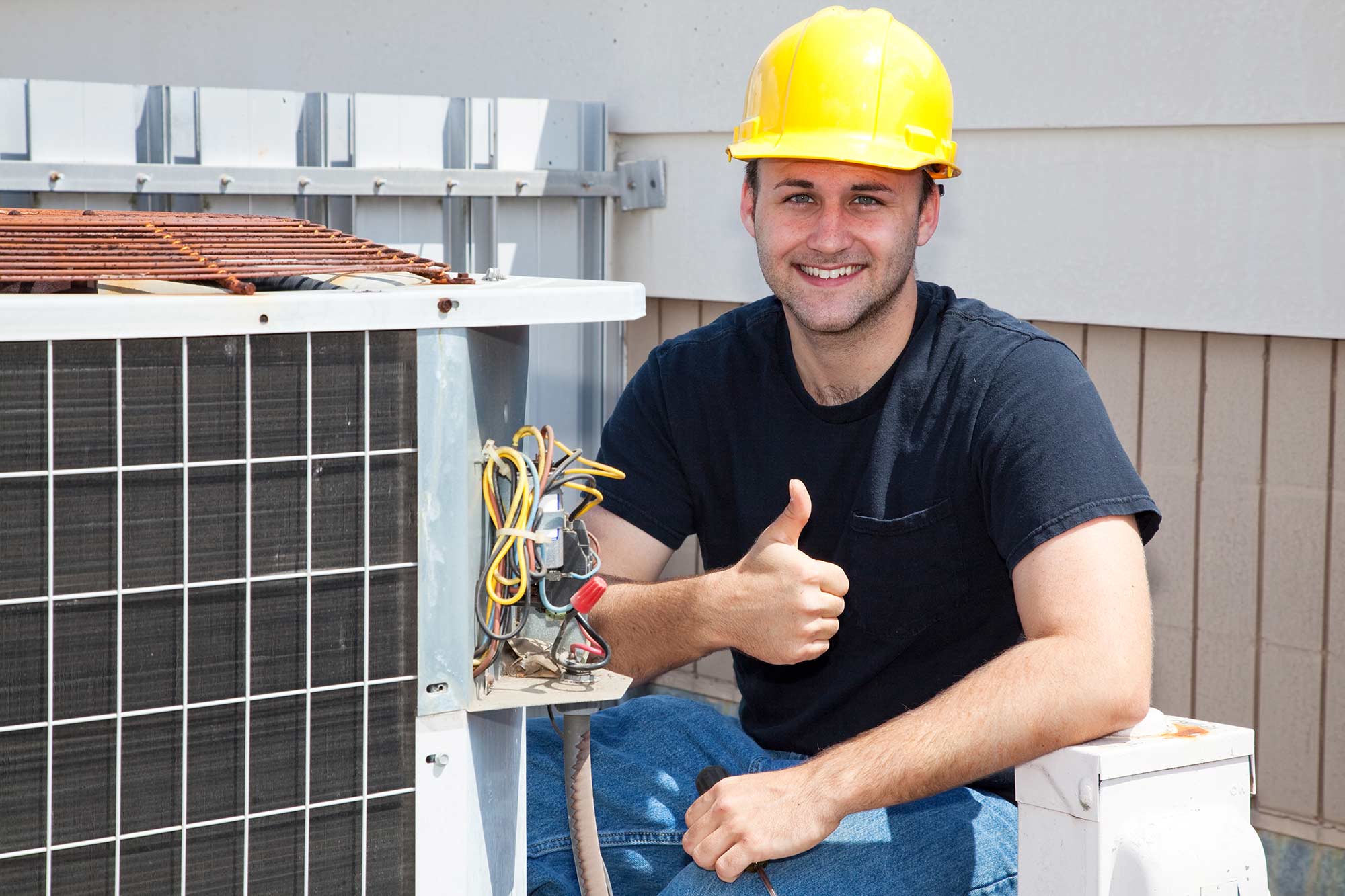AC unit replacement FAQs: expert responses
All Concerning Heating And Cooling: Identifying Common Issues and Effective A/c Repair Work Methods
Cooling and heating systems are crucial for keeping interior comfort. Understanding their components and performance is crucial for recognizing common concerns. Property owners often face issues such as inefficient air conditioning, weird smells, or climbing energy prices. These indicators can show underlying concerns that might call for attention. Exploring do it yourself troubleshooting methods can be helpful, yet knowing when to look for professional aid is just as important. What actions can be required to guarantee long-lasting performance?
Recognizing Your HVAC System: Components and Functionality
An a/c system, often taken into consideration the foundation of indoor environment control, consists of several crucial parts that collaborate to manage temperature and air quality. The main elements include the heating unit, air flow system, and air conditioning system. The heating device, commonly a furnace or boiler, produces heat during chillier months, while the a/c unit cools down interior areas throughout the summer.

Typical Cooling And Heating Troubles Property Owners Encounter
Home owners frequently deal with numerous common cooling and heating troubles, consisting of inconsistent temperature circulation throughout their living spaces. Additionally, uncommon sounds during procedure can indicate underlying issues that need attention. Attending to these worries quickly is vital for preserving suitable system efficiency.
Inconsistent Temperature Distribution
Lots of homes experience the irritating issue of inconsistent temperature level distribution, where specific spaces really feel uncomfortably warm while others stay too cold. This issue typically develops from a selection of aspects, consisting of poor insulation, blocked vents, or a poorly sized heating and cooling system. When ducts are not appropriately secured or when furnishings obstructs air movement, some rooms might get insufficient air conditioning. In addition, thermostat positioning can substantially affect temperature level law; a thermostat located in a sunlit location might misstate the overall temperature level of your house. Routine maintenance, consisting of cleaning filters and making certain ductwork is clear, can aid minimize these inconsistencies. Home owners might likewise take into consideration zoning systems to far better control temperature levels throughout various locations of the home, advertising a much more comfy living atmosphere.
Uncommon Noises During Operation
When an a/c system runs, uncommon noises can indicate underlying concerns that require focus. Home owners might run into a variety of noises, such as grinding, squeaking, or hissing. Grinding sounds frequently indicate worn-out bearings or elements, while squeaking can suggest loosened belts or parts requiring lubrication. Hissing may suggest a cooling agent leakage, which can endanger the system's effectiveness. Furthermore, banging noises could point to loose ductwork or a problem with the blower follower. Each of these sounds acts as a caution, prompting homeowners to examine additionally. Overlooking these indicators can lead to even more significant issues and costly repair work. Regular upkeep and punctual interest to uncommon sounds can improve system durability and efficiency, making sure a comfortable living environment.
Indications That Indicate Your A/c Requirements Repair Service
Just how can one inform if their air conditioning device needs fixing? Numerous signs may indicate underlying issues needing professional attention. Initially, if the a/c falls short to cool the space efficiently, it may recommend a refrigerant leak or compressor malfunction. Furthermore, a boost in power costs without matching usage changes might signal ineffectiveness in the system. Homeowners ought to likewise look out to uncommon smells originating from the device, which might indicate mold and mildew growth or electrical problems. Moreover, if the AC regularly cycles on and off, it may be a sign of a defective thermostat or various other mechanical problems. The presence of water pooling around the unit can show a clogged drainpipe line. Recognizing these indicators early can conserve time and cash, ensuring that the a/c system runs effectively and successfully.
Do It Yourself Troubleshooting Techniques for Heating And Cooling Issues
When facing heating and cooling issues, property owners can utilize YOURURL.com numerous DIY fixing strategies to determine the trouble. Trick approaches consist of inspecting thermostat settings, examining air filters, and reviewing drainage issues. These actions can aid determine common malfunctions before seeking expert support.
Inspecting Thermostat Settings
What actions should property owners take to guarantee their thermostat setups are correct? Initially, they should validate the thermostat is established to the wanted temperature and mode, whether home heating or air conditioning. Looking for a clear display screen and confirming the thermostat is not set to "hold" or "getaway" setting is important. House owners must likewise validate that the thermostat is degree and mounted in a place without drafts, direct sunshine, or other temperature influences. In addition, altering the thermostat can help give accurate analyses. If the thermostat operates on batteries, replacing them might settle any problems. By methodically reviewing these aspects, homeowners can usually identify and rectify thermostat-related problems, promoting ideal cooling and heating system performance.
Inspecting Air Filters
Air filters play a necessary role in preserving perfect heating and cooling efficiency. They catch dirt, allergens, and various other particles, guaranteeing clean air flow. With time, Discover More Here filters can end up being clogged, minimizing air flow and performance. To check air filters, people should initially locate the filter, frequently discovered in the return duct or near the heater. When located, they ought to review the filter's condition-- if it shows up unclean or stained, it likely demands replacement. Many filters require altering every 1-3 months, depending on use and ecological aspects. Normal assessment and prompt replacement of air filters not only improve air high quality however likewise extend the life-span of HVAC systems, stopping potential breakdowns and expensive repair work.
Assessing Drainage Issues
Just how can home owners effectively recognize and deal with water drainage issues within their a/c systems? They ought to examine the condensate drain line for obstructions or blockages, which can lead to water buildup. heat pump installation House owners may make use of a wet/dry vacuum to remove any type of debris blocking the line. Next off, checking the drain frying pan for rust or leakages is essential, as a harmed frying pan can create water to overflow. Regular cleaning of the drain line with a blend of vinegar and water aids prevent future obstructions. Additionally, making certain correct slope of the drain line promotes reliable water circulation. If these do it yourself techniques do not solve the problem, getting in touch with an expert cooling and heating technician might be required to prevent possible water damage and system failure.
When to Call a Professional for A/c Fixings

While some air conditioner issues can be managed through DIY techniques, there are scenarios where calling an expert comes to be essential. Property owners need to look for experienced help when they encounter relentless troubles, such as inadequate cooling, odd noises, or uncommon smells emanating from the system. These symptoms might indicate deeper issues that need specialized knowledge and devices to detect and repair properly.

Preventative Maintenance Tips for HVAC Durability
Routine preventative upkeep can considerably boost the longevity of a/c systems. Homeowners need to arrange yearly examinations by licensed service technicians to analyze system performance and identify potential problems. Frequently changing or cleansing air filters is important, as this warranties proper air flow and decreases pressure on the system. Furthermore, checking and sealing ductwork protects against power loss and improves total performance.
It is also advisable to keep the outside device clear of particles and plant life, enabling for peak air flow and warmth exchange. Home owners ought to evaluate the condensate drain for clogs to prevent water damage and mold and mildew growth. Maintaining ideal thermostat settings and using programmable alternatives can improve energy efficiency. Finally, documenting maintenance activities aids track solution history and can aid in determining reoccuring concerns (HVAC contractor). By complying with these preventative procedures, people can take full advantage of the effectiveness and lifespan of their a/c systems
Frequently Asked Inquiries
How Often Should I Replace My A/c System Filters?
A/c system filters must generally be changed each to 3 months, depending on usage, filter type, and environmental variables. Regular substitute assists maintain performance and air high quality, guaranteeing peak system efficiency throughout the year.
What Size A/c System Do I Required for My Home?
To identify the appropriate a/c system dimension for a home, one must consider square video, insulation high quality, and neighborhood climate. Consulting a professional can aid guarantee maximum efficiency and convenience for the particular living area.
Are There Eco-Friendly Cooling And Heating Options Available?
Yes, eco-friendly heating and cooling alternatives are offered, including energy-efficient warm pumps, solar-powered systems, and geothermal heating. These alternatives lower energy consumption and environmental impact, advertising sustainability while maintaining effective environment control for property and commercial areas.
Just How Can I Boost My HVAC System's Energy Effectiveness?
To improve a/c energy efficiency, one can on a regular basis keep the system, seal air leaks, set up programmable thermostats, make use of energy-efficient filters, and assurance appropriate insulation throughout the home to decrease energy intake and improve performance.

What Is the Typical Lifespan of a HVAC System?
The ordinary lifespan of a HVAC system typically ranges from 15 to 25 years, relying on factors such as maintenance, use, and the quality of installation. Normal maintenance can significantly prolong its functional long life.
Final thought
In summary, a thorough understanding of HVAC systems encourages house owners to identify typical issues and address minor troubles effectively. Identifying indicators of malfunction, employing DIY fixing strategies, and focusing on routine upkeep can boost system performance and efficiency. Nevertheless, when confronted with complicated repair services, getting specialist assistance is critical to ensure safety and security and durability. By cultivating understanding and positive treatment, people can take pleasure in a comfy interior atmosphere while reducing unexpected prices related to HVAC failings.